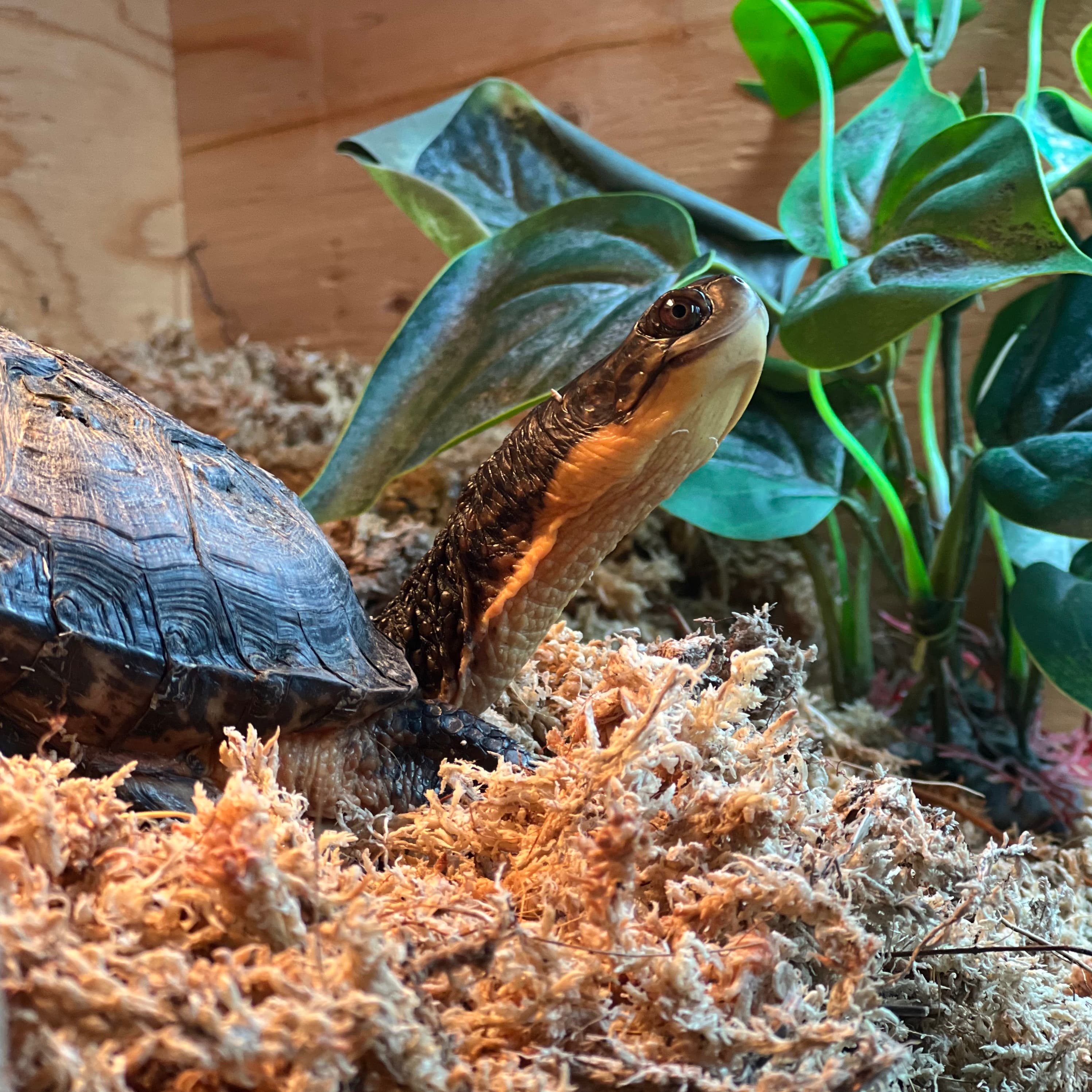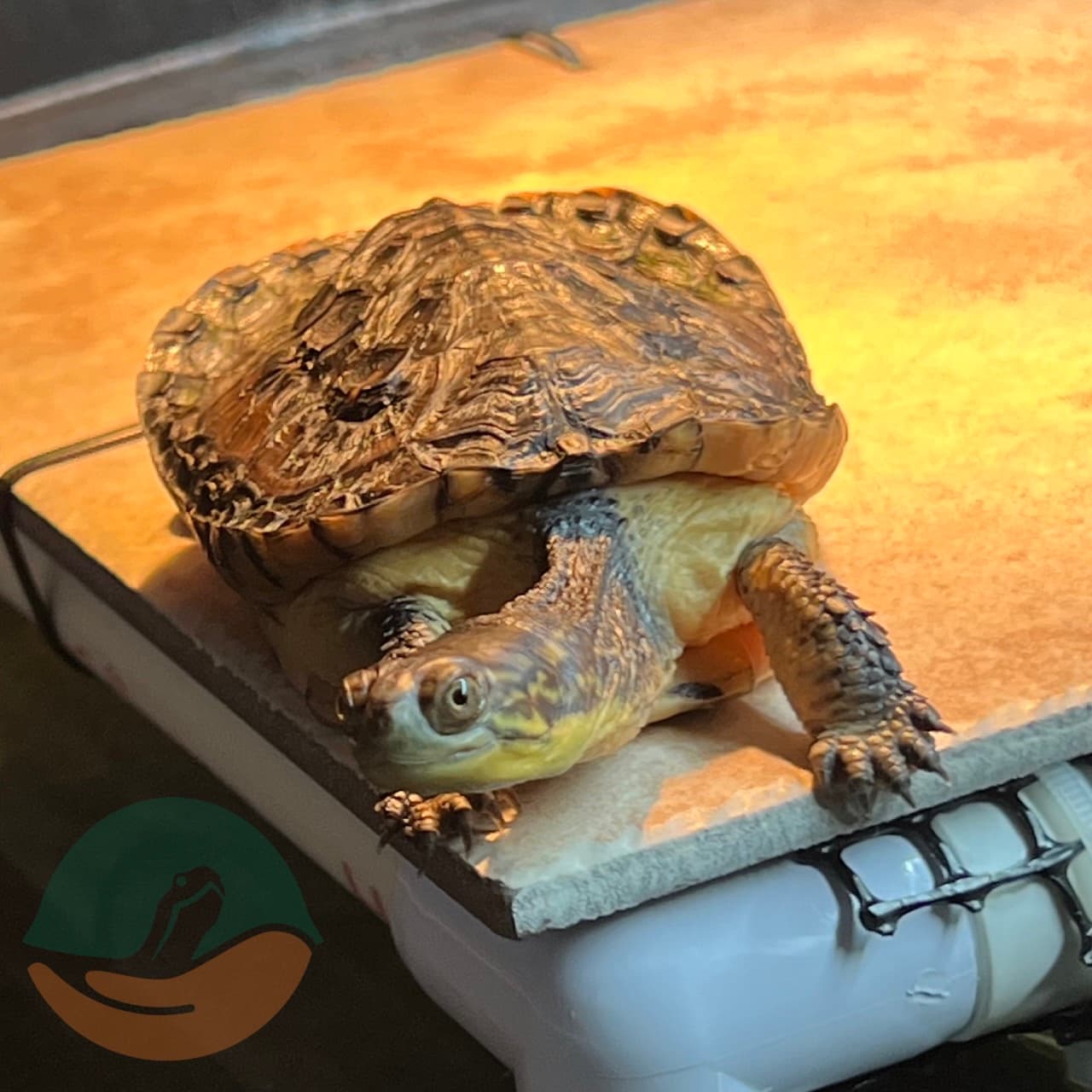Ambassador Spotlight: Elvira
Elvira is a cherished Blanding's turtle ambassador at New Hampshire Turtle Rescue.
Blanding’s turtles are listed as critically endangered in New Hampshire and endangered by the IUCN.These remarkable turtles can live more than 70 years in the wild! However, their long lifespan comes with a challenge: Blanding’s turtles don’t reach sexual maturity until they’re between 14 and 21 years old. That means they must survive for well over a decade before they can even begin to reproduce. Fortunately, once mature, they can reproduce throughout their lives—making longevity essential to the survival of the species.
Protecting their habitats is key. Blanding’s turtles rely on both wetland environments and surrounding upland areas for nesting and migration. By safeguarding these critical landscapes, we can help ensure that Blanding’s turtles continue to thrive for generations to come.
In addition to protecting habitats, it's crucial that we do not take them from the wild. While we are so grateful to have her in our lives and she spreads so much joy daily, she was robbed from a natural life when she was taken from the wild. She deserved so much better.
Read more about Elvira's journey below.


Close-up of Elvira, a non-releasable Blanding's turtle ambassador
* Splish splash splash * As I enter the room, I look over at the commotion as a little turtle swims frantically at the corner. Her throat is ballooned out in front of her, her little arms treading water as fast as she can, as if she's trying to break through the plastic barrier that separates us. As I approach and look down, she lifts her head out of the water, looking towards me, and her mouth opens slightly. I can't help but giggle whenever I see it. I drop in a few pellets, but she is still desperately swimming and staring at my hand, missing the pellets dropping in the water, and they quickly disperse. When she finally notices, she lowers her head below the water, and quickly strikes, downing multiple pellets at once.
This energetic little turtle is named Elvira, a juvenile Blanding's turtle. Elvira is an ambassador at NH Turtle Rescue. She was admitted on May 22nd, 2023, after being kept as a pet illegally for two years.
Elvira is a Blanding's turtle, an IUCN endangered species which is considered critically endangered in New Hampshire. Female Blanding's turtles reach reproductive maturity late in life, and may take 20 years or more just to be able to make the next generation. They can live to be over 80 years old, and will reproduce throughout their lifetime, so it is important they stay in the wild and contribute to their population. It is still unfortunately not uncommon for people to pick up turtles in the wild, even if illegal, which is incredibly detrimental for many reasons. Read our Keep Wild Turtles Wild blog post for more details on why to never take turtles from the wild.

A young Elvira peeking curiously
When Elvira was first surrendered to NH Fish and Game, she was in horrendous condition. It was clear right away she had Metabolic Bone Disease (MBD). Her shell was rough and the margins flared straight upwards. Blanding's turtles normally have a smooth carapace (top shell) along with a hinged plastron (bottom shell) that allows them to completely retract into their shells and lift up the plastron to seal up the shell with them inside. But due to her size and the shell deformities, Elvira was unable to retract into her shell, leaving her sensitive areas exposed. She also was completely dull with no color, and her body was so swollen with the tiniest little stick arms and legs protruding from her body, angled harshly to either side.
She could hardly move. She was still, however, able to swim, and it was clearly a lot easier for her to move in water than on land. That would be the case for any aquatic turtle, but the water also created a buoyancy that really helped with her mobility. Her movements were so rigid and she hardly had the energy to drag herself onto her basking platform. She would lay her head on the platform while basking, unable to keep her head up. Her eyes were puffy and closed, a common sign of vitamin-A deficiency, and initially she could only slightly open one of her eyelids to peak out.
NH Turtle Rescue is operated by wildlife rehabilitators and is dedicated to the rescue, rehabilitation, and release of wild turtles native to New Hampshire. Wild turtles are typically admitted after experiencing trauma, such as being hit by a car, and our goal is always to rehabilitate them so they are healthy enough to return back home. We are not a pet rescue, and when a turtle is kept as a pet, there's many reasons they are likely to never be able to return to the wild, such as disease transmission, a reduced chance of survival, etc. We assess on a case-by-case basis, but in this case we knew Elvira was non-releasable, but we are able to provide a home for her as an ambassador for her species. She is an ideal candidate for being an ambassador, since she has lower stress around humans.
Elvira severely malnourished when she was first admitted
She was also only 25 grams! As a comparison, two Blanding's turtles we received in November, whom we kept just over winter, were over 100 grams each in only 6 months. Elvira in comparison was 25 grams after 2 years! She was seriously underweight. Elvira surely did not have access to any of the necessities - UVB, proper nutrition, an appropriate thermal gradient for her species, etc. She was in a standstill for 2 years, and it showed. She was so malnourished, we really weren't sure if she was past the point of recovery.
But Elvira made it clear she was determined to be in better health! She started eating on her own very quickly. We kept her exclusively on pellets initially, since they are nutritionally balanced, and she needed to be on a strict diet while she was recovering. She didn't care, she was happy to eat every pellet that she came across, and seemed to be on a mission to grow as fast as possible.
Elvira when she was first admitted. She had the tiniest little stick limbs and she had difficulty moving.
The time flew by. Before we knew it it was August and she was already almost 100 grams! She outgrew her first enclosure and got a bigger upgrade. It's hard to see the small bits of progress when seeing them daily, but even we could see how much the shell flattened out over that time, which was so encouraging. When that much damage is done to their shell, it is not correctable. There is also inevitably damage done internally. But with how young she is still, plus how much it already has improved and the fact Blanding's tend to grow to much larger sizes than most, we hope her shell will start to look increasingly normal and that there can be some significant improvement as she grows in size.
JAN 2025 UPDATE:At her January 2025 check-in, Elvira was 600 grams!She's such a big girl and her shell still shows the signs of previous deformities but it has straightened out so significantly.We are so proud of her and she's still her energetic, personable, beautiful self.
When I look at the healthy Blanding's hatchlings and juveniles that come into care, sometimes a sadness comes over me when I think about how Elvira looked just like them at one time. She could've lived a long life in the wild, but instead was kept in captivity only a short time, but enough damage was done to last a lifetime. She now has permanent scars she will carry throughout her life, making her non-releasable and likely having reduced her overall lifespan.
While we feel so blessed to have her in our life, and will do everything we can to make her as comfortable and happy as possible, what she deserved was freedom. Elvira should be a productive member of her local Blanding's turtle population and a critical part of the wetlands ecosystem she called home, but instead it was all taken away from her. We hope Elvira's tale as an ambassador will shed light on all the turtles who are taken from the wild. It's so important to leave them in the wild - important for the ecosystem, for their populations, and for them as individuals. In Elvira's honor, educate a friend or family member about this importance, so we can keep spreading the word as a community, and doing right by our shelled neighbors.
